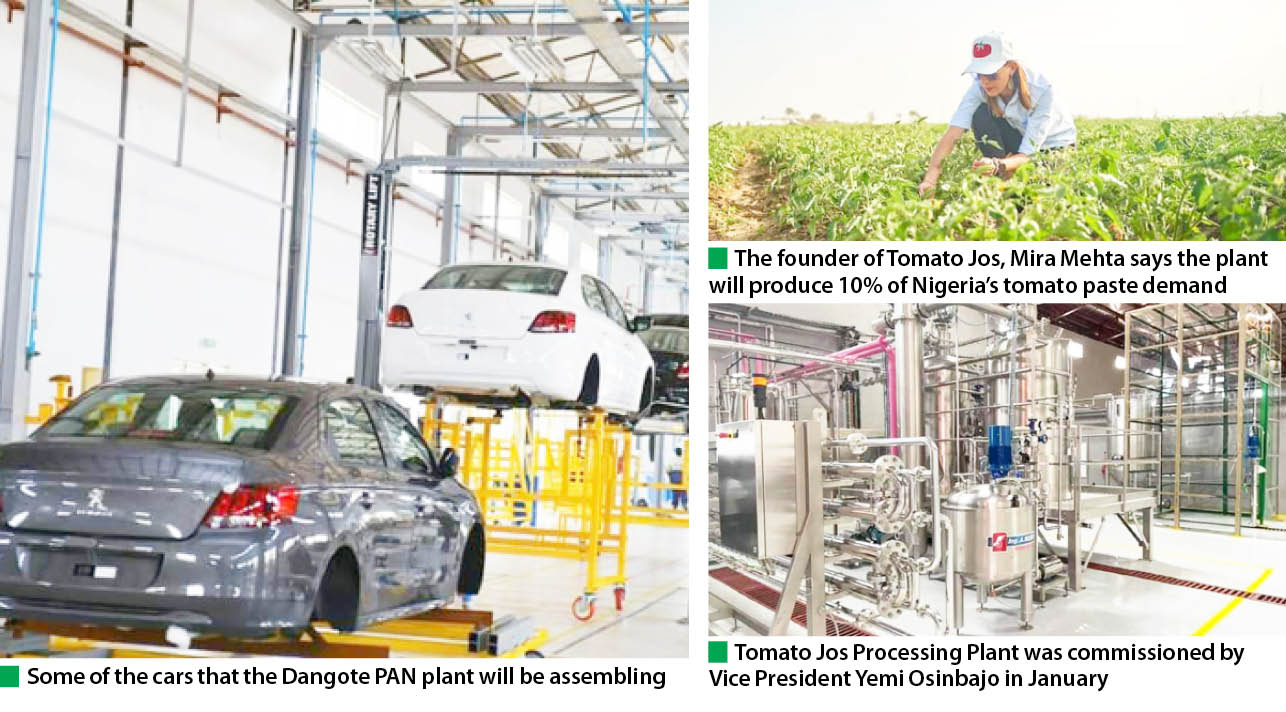Notwithstanding the challenge of insecurity bedeviling the state, especially kidnapping and banditry, which have sacked communities in the outskirts of Kaduna State, industries are springing up and investing multi-million dollars in processing, production and manufacturing of foods and other household items.
One of the major achievements of the Malam Nasir El-Rufai-led administration is the attraction of multinational companies and investments to Kaduna State. The government has, since inception in 2015, designed deliberate economic and investment policies to boost industrial revolution and create employment for the teeming youths of the state.
- 2023: PRP’s Durojaiye declares for presidency
- NEF’ll only support candidate with will to tackle insecurity – Baba-Ahmed
Some of the investments attracted to the state include $100 million Olam Feed Mill and Hatchery, Dangote Peugeot, Tomato Jos, Damau Household Milk Farm, Barbados Fertiliser Blending Plant.
Governor El-Rufai had said at the 2021 edition of the Kaduna Investment Summit that his government had so far attracted both local and international investments worth over $500million into the state in the last three and half years and created over 100,000 jobs, a feat he said was possible because of the government’s ability to make the state investors’ destination.
“The biggest challenge we face as a government is job creation. We, therefore, have to come up with numerous policies and reforms that would make Kaduna the first choice of investors in Nigeria. We know we are competing with 35 other states and the Federal Capital Territory (FCT). We also know we are competing for investable funds around the world. So we have to be better than the best to attract more investments,” he had said.
Banditry and other violent crimes claimed 1,192 lives while 3,348 persons were kidnapped in 2021, according to the annual security report presented to the governor by the state Commissioner for Internal Security and Home Affairs, Mr Samuel Aruwan. However, the disturbing security situation did not deter the investors from pitching their tents in the state.
Olam
Olam International, a leading agri-business operating across the value chain in 70 countries, has invested US$100.0 million (approximately N30.0 billion) on animal feed mill, poultry breeding farms and a hatchery producing day-old-chicks in Chikun Local Government Area of the state, along the Kaduna-Abuja highway.
At full capacity, the feed mill is said to be producing in excess of 400,000 tons per annum, of high-quality poultry and fish feed, with the facility supplying mainly to the northern markets. The poultry breeding farm is also estimated to be producing about one million hatching eggs every week for the hatchery.
Daily Trust on Sunday gathered that the feed mill is procuring most of its corn and soybeans requirements locally, spurring growth of the domestic crops, and has created over 100,000 metric tons of in-house storage capacity, which is also helping to support food security.
Dangote PAN
Dangote Peugeot Automobiles Nigeria (PAN) Limited, a firm co-owned by Africa’s richest man, Alhaji Aliko Dangote, through his conglomerate, Dangote Industries Limited, the governments of Kaduna and Kebbi and a technical partner, Stellantis Group, the parent company of Peugeot, has since commenced manufacturing vehicles in Nigeria, starting with the Land Trek, 3008, 5008, and the new 508.
The vehicles are being manufactured at the newly constructed Green Field Assembly Plant in the industrial area of Kakuri, Kaduna South Local Government Area of the state.
According to reports, the assembly of Peugeot vehicles comes nearly four years after joint owners Dangote Group received approval from the Nigerian regulator after previously expressing interest in the former Peugeot plant, now known as PAN Nigeria Ltd.
The newly built Green Field Assembly Plant, according to the Nigerian automaker, can assemble 120 vehicles per day across two shifts. The management also stated that the vehicles that would be introduced would be distinguished by their outstanding aesthetics, rich technological endowment and safety features.
The Dangote PAN is doing a lot with the New Green Field Ultima Assembly Plant to ensure visibility of the Peugeot brand and availability of spare parts to the network and the generality of Nigerians.
“Our technical partner will encourage DPAN to reposition the brand in the short, medium and long term to ensure customer satisfaction and sustainability.
“This dream began with the re-launch of the Peugeot brand in Nigeria, as well as the local assembly of the 301 at our new Kaduna plant, and was followed by the introduction of the Landtrek, 3008, 5008, and new 508. Nothing is being spared in order to reclaim the market, so all hands are on deck to ensure not only survival but also continued growth in a market with a potential for 100,000 units per year and growing.”
Tomato Jos
Another notable investment attracted to Kaduna is an agro-processing company known as Tomato Jos, led by American-born entrepreneur Mira Mehta.
Tomato Jos has officially launched its tomato paste factory in Kaduna State, almost seven years after it first started growing tomatoes in the country. The facility is said to be the third-largest of its kind in Nigeria and can produce one carton of tomato paste sachets every minute.
Tomato Jos works with smallholder farmers to increase yield, reduce losses after harvest, and get optimum returns from sales to customers.
Since it was founded in 2014, the company has directly supported over 70 farmers in growing their average yield by over 340 per cent from 5 to 22 metric tons per hectare, while increasing average income 455 per cent.
Daily Trust on Sunday gathered that Tomato Jos, at the initial stage, had focused on efficient production of tomatoes and paste, solving the problems of wastage in the value chain. They are, however, working on installing a drip irrigation system and a tomato processing plant that can produce 24 tons of finished products per day.
Mira Mehta, the founder and chief executive officer of Tomato Jos said, “Processing has always been the plan for Tomato Jos, but to get there, we spent a long five years working only on farming and primary production to make sure that we have a really solid foundation in place.
“Five years later, Tomato Jos has become a 500-hectare enterprise, with plans to work with thousands of small-scale farmers on over 2,600 hectares of land. We estimate that we can generate more than $1 million in direct income for the local economy each year.”
Daily Trust on Sunday gathered that the company’s big plans are backed by a consortium of investors, including Goodwell Investments, a Netherlands venture capital firm.
Damau
Also, Arla Foods has since partnered with the Kaduna State Government and MILCOPAL Nigeria Limited, a dairy farmer cooperative in Kaduna State, and commenced the off-take of milk from over 400 local pastoralist farmers and counting, renovated and operationalised the Kaduna State dairy and commenced production and sale of local dairy products for the Nigeria market.
“Developing the local dairy sector is an important part of our business in Nigeria and a central part of Arla’s Global Sustainability strategy. We will only be successful in the long term if we work together with local farmers to create a viable and sustainable dairy business. We are committed to growing responsibly in Nigeria, and we have reached an important milestone in establishing our commercial Arla Farm in Damau. It is our ambition to further increase the off-take of locally produced milk from pastoralists,” the managing director, Arla Foods Nigeria, Peder Pedersen said.
He added, “The Arla Farm aims to provide a showcase for a fully functioning and sustainable commercial farm in Kaduna. This is in addition to the partnership with Kaduna State on Damau Household Milk Farm to establish a settlement project on 9000ha land where Arla will enable milk collection and provide services with regard to feed establishment and management, irrigation management, artificial insemination, crossbreeding and initial handling and quarantining of cattle.
“The commercial dairy farm currently sits on land acquired in Damau, Kaduna with planned feed and grassland development of locally-sourced Bracharia and Napier grass seeds. Land clearing and fencing has been completed, and grassland establishment is currently in progress.
“Irrigation facilities will be set up for forage production, using the rai-ngun system for the Arla Farm, and 400 crossbred milking cows will be imported to ensure high yield and quality of milk for processing. Lastly, milk collection equipment for sustainable milking will also be established on the farm.”
He also said, “Arla Foods prides itself in being a reliable investor and developer of the Nigeria local dairy market. A fundamental requirement is that market framework conditions are in place, access to the Nigerian market is sustainable, fair and predictable, and that access secures a viable business environment for companies that are investing in the dairy industry in Nigeria.”
Barbedos Fertiliser Blending Plant
Still in the line of notable investments to Kaduna is a fertiliser blending plant established by the Barbedos Group of Companies, which has invested between 10 million to 15 million US dollars.
“I have been into the fertiliser business since 2004 and I am an importer, so we decided to establish a fertiliser blending plant here in Kaduna to support farmers and ease the challenges they go through in terms of access to fertiliser, the chief executive officer and chairman of Barbedos Group of Companies Limited, Kashim Bukar Shettima said.
He said that regardless of the insecurity facing the state, the company will employ 200 to 300 workers.
He disclosed that the company was building a rice mill worth US$15million, with a capacity to produce 200 tons per day.
“The rice mill, we hope, will be completed by the first quarter of this year. We have all the machinery or ground, it is just the boiler that is delaying,” he said.
He called on the government of Kaduna State to do more in harmonising communities by giving them a sense of belonging, saying, “It is only by doing that will residents of the state own up and address the security challenges being faced.”

 Join Daily Trust WhatsApp Community For Quick Access To News and Happenings Around You.
Join Daily Trust WhatsApp Community For Quick Access To News and Happenings Around You.

